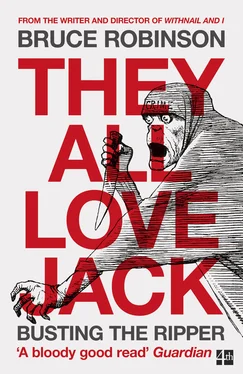The Yard headed off to the Continent, forcing their quarry out of non-extraditable France, only to discover in Brussels that the British government had no enthusiasm for such extraditions. The Home Secretary, Matthews, was informed by the Prime Minister that he didn’t ‘consider this a case in which any official application could be made’. The Liberal MP and publisher Henry Labouchère had an alternative point of view. ‘If it had not been intended to extradite Hammond,’ he asked, ‘what was their object in hustling this man from France to Belgium?’ A good question, and while no one was answering it, Hammond and his boy took off for America with further judicial pretence in hot pursuit.
But no one was actually interested in arresting Hammond – he was the last thing the Establishment needed in court. Instead it was Inspector Abberline who was put up to take the flak. ‘Coming to the facts of the case,’ reported The Times , ‘the police had received all the information it was possible to obtain in this matter. Inspector Abberline had on that date [July 1889] all the information in his hands. But for some reason he did not act. Counsel considered that the whole cause of the mischief that had arisen through the spread of these disgraceful scandals, was the conduct of Inspector Abberline in allowing the man Hammond to leave the country. A more remarkable introduction to a prosecution in which it was suggested that the course of justice had been perverted never could be imagined.’71
Such sentiments were of course dwarfed by the concurrent scandal of the Ripper. Abberline was perverting the course of justice in precisely the same way ‘justice’ was made laughable in respect of Jack. Both the Fiend and the Arse-Seller were immune from Victorian law. What the authorities wanted from Hammond – and the only thing they wanted – was a clutch of letters he kept about his person, acquired no doubt through his connections with the Post Office trade. Having lost his income as a brothel keeper, the fear was that he’d create a new one through blackmail. These letters contained the goods on Somerset, Euston, P.A.V. et al., and were worth a good deal of money. They were also of inestimable value to anyone trying to prove the case.
A detective called Partridge was dispatched from London with instructions to ‘secure the letters at any price and at all hazards’. He at last caught up with Hammond in California, and got hold of the letters in the name of justice, at a price unknown. On his way back to England he ran into a man in San Francisco who introduced himself as ‘Tyrell’, and stated that he had been ‘sent out from London to aid Partridge’.
With the letters now in his possession, what aid Partridge might have needed is unclear. But after presenting ‘credentials and testimonials’, Tyrell gained Partridge’s confidence and the keys to the ‘zealously guarded’ box containing the letters, which mysteriously ‘disappeared one night’, along with Tyrell.
Like so many bits and pieces of unwanted history, Mr Tyrell and his stolen letters were never heard of again. His evaporation meant, of course, that those for or against the accused at Cleveland Street had either lost or secured irreplaceable evidence, depending on whose side you were on.
It was at about this time that someone walked into the Star offices and presented Ernest Parke with the journalistic equivalent of a Mickey Finn. The informant told him that, like ‘Podge’ Somerset, the Earl of Euston had made a run for it. This was sensational news, exclusive to the Star . But when editor T.P. O’Connor heard it, and more importantly, who had offered it, he declined to have anything to do with the story. Parke, however, fell for it, and published it in his own newspaper, informing his readers that Euston had fled for South America, and was heading for Peru.72
For Salisbury’s government this was manna from heaven – no seraphim could have dealt better news. By any standards, something remarkable had happened. Suddenly, it wasn’t a question of Euston raping boys, but the unspeakable outrage of a newspaper accusing him of going to Peru! A storm of indignation raised itself inside the political Establishment. Lethal nonentities reached for their wigs. How dare any man accuse another of going to Peru? He hadn’t even been to Ramsgate!
In reality, the only place Euston had been was to Boulogne, to visit fellow arse-artist Somerset, and coordinate their story.
Literally overnight, Parke was a pariah, a dangerous little North London Zola, menacing the freedoms of an unfettered press and clean sheets in general. Peru? The ignominy of it! The man must be crushed with the full wholesome mechanism of pure Victorian law.
Parke had been set up, sold a pup, conned by a breed we shall be hearing more from. I was certain that this bum steer could be sourced back to Scotland Yard, but it wasn’t until the 28 January 1890 edition of a conservative magazine called the Hawk turned up that I could confirm it:
It may be remembered that Parke said he had certain evidence to prove that he acted in good faith (as I believe he did), which, however, he could not bring forth without sacrificing confidences. I have no confidences placed in me, and so I am sacrificing nothing. It is alleged that the way the information reached the Star was by an officer employed at Scotland Yard. It is also said that having promised to supply Parke with proof when the time arrived, when called on by Parke to fulfil his promise, the officer said he was instructed by his superiors to give no more information.73
Scotland Yard made no comment. Euston sued Parke for criminal libel, and the guilty were back in business. It’s hard to believe that this actually happened. Even the sanctimonious voice of conservative Fleet Street could hardly believe it. ‘We have no sort of sympathy with the prosecutor, Lord Euston,’ wrote the Standard , virtually inviting prosecution itself, ‘who admitted quite enough about his own tastes and pursuits to show that he has very little claim to the respect of persons of decent life.’
(Not a lot of irony there, then? Euston was a bosom pal of the future King, actually becoming Edward VII’s aide de camp in 1901. But then, the Standard wasn’t in line for the throne, so nobody bothered with twaddle like that.)
The judge initially selected to hear the case was kicked off, and replaced by another of more ferocious disposition. Out of the Athenaeum shuffled yet another intimate friend of the Prince of Wales, the Honourable Mr Justice Hawkins, later Baron Brampton, a vengeful seventy-two-year-old Catholic with a profound affection for coin.
Hawkins was notorious for his greed. ‘On the make’ was what they said of him, this disagreeable feature of character ameliorated only by his fondness for the oiled rope. He was known as ‘Hanging Hawkins’, although he was said to have a quite energetic fear of death himself.74
On this mercifully non-hanging occasion, Hawkins was to represent the apogee of institutionalised corruption for and on behalf of the Victorian ruling elite. Never mind what Albert Victor and his homosexual associates had been up to, this was the judge who had recently put a schoolboy into prison for five years for doing the same thing. ‘I was horrified by the apparent brutality of the sentence,’ wrote an official who had been present at the Old Bailey, ‘and the thought that if the youth had belonged to a different class in society his offence would have been treated quite differently and never have been made public at all.’75
And that’s what this venal pantomime was all about. As far as Hawkins was concerned, it was making upper-class buggery public that was the very grave offence. Parke stood before this ancient bigot to hear what Disraeli had described as ‘Truth in Action’ – in other words the process of British law.
Читать дальше











